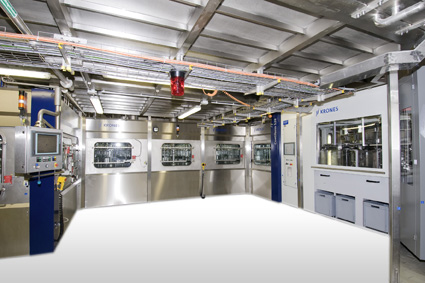Filling
Balf is a part of the city of Sopron, located near Hungary’s border with Austria and is situated directly on the edge of the Neusiedler See National Park. This region is also known for its excellent mineral water. Here, the company PET-Pack packages the mineral water “Balfi” as well as over 60 different non-alcoholic beverages. Problems with foaming were experienced with all of these products during filling, especially with those containing sugar. In order to solve this problem, two possibilities were examined: one option was to implement a very energy-intensive cooling process, and the other, to install a cavitator manufactured by CavitatorSystems GmbH, based in Landshut, Germany.
Filling
About 1000 customers obtain their beverage requirements from the five associated breweries and various external depots – a massive logistical undertaking, in particular in a sector in which demand is highly dependent on unpredictable factors. In order to ensure that forwarders do not have to wait for hours for loading at peak times, the company decided to install a Tislot® time slot management system.
Filling
In April 2010 the Novosibirskprodmash Company, Russia, starts the sales of its cost effective growler filling systems PEGAS CrafTap in the USA and Europe. The pilot samples of the PEGAS CrafTap last were presented to the beer community in April at the Craft Brewers Conference & BrewExpo America 2010 in Chicago/USA.
Filling
In December 2010, Krones has received a letter of non-objection from the FDA for a rotary dry-aseptic PET-bottle filling system featuring H2O2 as the sterilising agent.
Filling
The British fruit juice producer “The Serious Food Company” has standardised all areas of process monitoring when extending its production plant in South Wales and uses exclusively instruments from the Swiss Baumer Group of Jegenstorf, for measurement of pressure, temperature, fill level and conductivity. High flexibility within the plant is assured by the specifically developed universal process connection system.
Filling
ESTRAGON: Do you know the story of Belgium’s beer cafés? VLADIMIR: Stop it! ESTRAGON: They go quietly. More than 1,500 last year. VLADIMIR: STOP IT! ESTRAGON: Some stay and fight. But many retreat into the shadows. VLADIMIR: I remain in the dark. ESTRAGON: This is how it is. In western Europe, beer consumption is going down. Yet, in Germany they worry themselves sick over Feinstaub, in Britain they angst over Europe, and in Belgium, where the writing is on the wall for most village cafés, punters just shrug their shoulders and drink their beer elsewhere. VLADIMIR: Nothing can be done. ESTRAGON: Well, there is always the black economy and tax dodging. VLADIMIR: What do brewers do? ESTRAGON: They cry into their beer. And wait for Godot, err the taxman, to clamp down on errant publicans. Or, if they are clever, they rev up beer exports to the U.S.
Filling
Global multinationals or small regional brands: No matter what the scale of operations, every brewery is keen to find a way of addressing the growing demand for convenient multipacks. But the key challenge here is to develop a way of reaching the consumer which is both profitable and sustainable. The search is on for an overall concept which is oriented to customer needs, cost efficient and also capable of integration into existing mechanical and logistical filling processes.
Filling
Krones has developed a new cellar concept that design-enhances the field-proven double-seat valve technology with a decentralised approach to fully automated cellar systems. The new TwinPro cellar concept is based on double-seat valves, grouped together in filling and draining racks. Several tanks can be linked to the filling and draining valve racks in what are called tank loops. The number of tanks per loop is chosen to meet the specific requirements of the client concerned.
Filling
The company Teutoburger Christinenbrunnen GmbH & Co. in Bielefeld has realized and implemented new options in the area of the filling hygiene in a short term. In June 2008 a filling line in the plant Bielefeld was upgraded, so that during the running production the required hygiene status is kept during the whole filling time. With this technology beverages can be filled in their native form without adding any preservative
Filling
The Ziemann Group announces a further major development at the drinktec 2009 fair: After acquiring a majority holding in the company BMS Maschinenfabrik, a German manufacturer of packaging and palletising plants, Ziemann has now entered a joint venture with the company Nanjing Light Industrial Machinery Corporation (NLM). The state-owned enterprise NLM is China’s largest manufacturer of filling and packaging plants.
Filling
Typical measurement points are in the filter cellar and in the filling plant. The use of long-life optoelectronic compounds and process proved wetted sensor parts leads to operational times which are significantly longer than for electrochemical membrane covered sensors. Further, the response time of optical sensors is 3-4 times shorter, resulting in less beer loss when switching from water to beer in the filling line. The compact InPro 8600 sensor is designed for the simultaneous measurement of low turbidity values and beer color in filtration and blending processes. A highly precise and robust optical set-up allows for scattered light measurements under the established angles of 25° and 90°. In a second measuring cycle the same optics are used for a color measurement according to EBC.mt.



